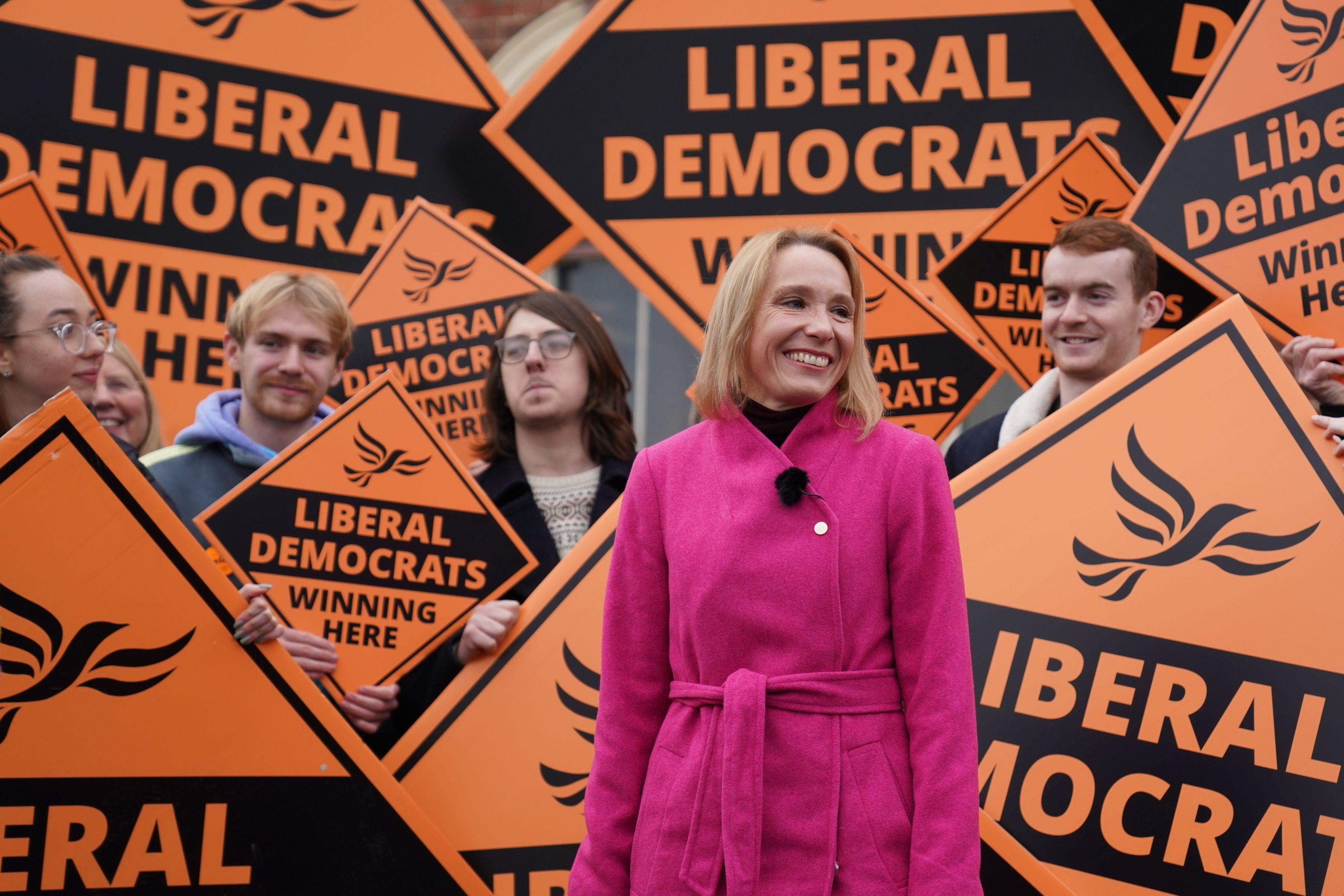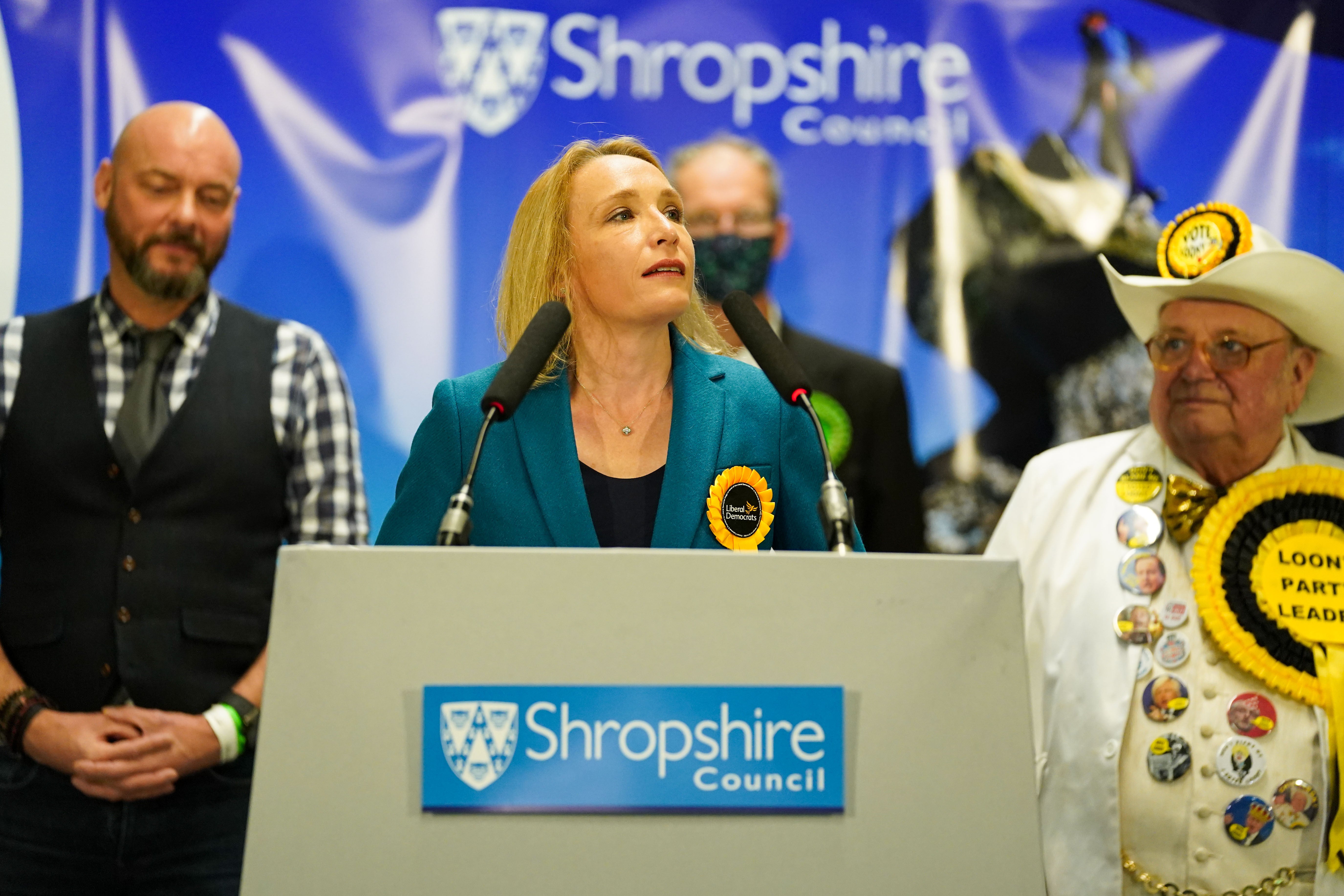Sleaze, shoe leather and stately homes: how Lib Dems won true-blue North Shropshire in historic by-election
While media at large has identified Boris Johnson as inadvertent cause of yellow victory, the result was also testament to a campaign nicknamed ‘shock and awe’...

Your support helps us to tell the story
From reproductive rights to climate change to Big Tech, The Independent is on the ground when the story is developing. Whether it's investigating the financials of Elon Musk's pro-Trump PAC or producing our latest documentary, 'The A Word', which shines a light on the American women fighting for reproductive rights, we know how important it is to parse out the facts from the messaging.
At such a critical moment in US history, we need reporters on the ground. Your donation allows us to keep sending journalists to speak to both sides of the story.
The Independent is trusted by Americans across the entire political spectrum. And unlike many other quality news outlets, we choose not to lock Americans out of our reporting and analysis with paywalls. We believe quality journalism should be available to everyone, paid for by those who can afford it.
Your support makes all the difference.On 10 November, a week after the North Shropshire by-election was called, Dave McCobb, the Liberal Democrat director of campaigns, drove up to spend a couple of days in the sprawling rural constituency.
With the party having finished third or fourth here for all but one election since 1992, his aim was to find a way of achieving a strong second place that could be built on in the future.
“His way of doing that is to just get out the car at random and knock on doors,” a party source says. “The very first house was someone who worked at the local Conservative club but said they’d be voting for us. The second was an elderly woman who’d voted Conservative all her life but was so fed up with them she ended up putting one of our posters in her window.”
Two days later, McCobb went back in London with an improbable message for party bosses. The Tories’ 23,000 majority and near 200-year hold on this seat could, he said, be overturned. The Lib Dems could win it.
“Dave masterminded Chesham and Amersham so his opinion carries weight,” says that source. “But it’s fair to say people were sceptical North Shropshire could be won.”
They are sceptical no longer.
At 4.30am on Friday morning, this area returned a non-Conservative MP for the first time since 1904.
In perhaps one of the most astonishing by-election results ever, candidate Helen Morgan didn’t just destroy the Tory majority, she built a substantial 5,925 one of her own. It was the biggest electoral swing since the Second World War.
Yet while the media at large has, over the past 24 hours, relentlessly focused on prime minister Boris Johnson as the inadvertent cause of this shock, such a conclusion only tells part of the story.
Rather, this was a victory based also on old-fashioned local knowledge, shoe leather and – because this is the Lib Dems – an army of electric cars.
Within days of McCobb’s recommendation they should go full throttle – “shock and awe” as the tactic is nicknamed – a campaign headquarters had been set up in a renovated barn at Soulton Hall near the market town of Wem. “Normally, you have an election HQ above a chip shop or down an alley,” says policy advisor Sarah Dobson. “This was definitely one of the more inspiring places we’ve worked.”

Almost immediately, local activists identified that, although the by-election had been called after former Tory MP Owen Paterson resigned on the back of a lobbying scandal, focusing on such sleaze was not necessarily conducive to a good result.
“At that point, the reaction to sleaze was for people just to not want to vote at all,” says one local activist. “But when you’re chasing a 23,000-vote lead, people not turning up is no good. You need them to flip.”
Instead, the party focused relentlessly on the key local issues of terrifyingly long ambulance waiting times and poor public transport. Again and again, they hammered home how the region had received no levelling up money, and how Brexit trade deals had repeatedly overlooked the region’s farmers. The overriding message was simple: a century of holding this seat had meant the Tories were taking it for granted.
In Helen Morgan, meanwhile, they picked a candidate who, though politically inexperienced, had one key advantage over her Tory rival Neil Shastri-Hurst: she was from the area and had a native grasp of all those issues in a way that a barrister from Birmingham simply did not have.
“It’s not parochialism to want an MP who understands the challenges in your area,” one lifelong Tory supporter Andrew Powell told The Independent midway through the campaign. “What does a lawyer from the country’s second-biggest city know of an agricultural place like this?”
As canvassers continued to report positive noises from the doorstep, more and more activists responded to appeals to help. A so-called tartan army of Scottish Lib Dems knocked on 14,000 doors. So many farmers began accepting placards for their fields that more had to be ordered. A seemingly never-ending queue formed at Soulton Hall’s electric car charging station as Lib Dems arrived from across the UK in their typical vehicle of choice.
Crucially, in a show that yellow tanks were being placed firmly on blue lawns, party leader Sir Ed Davey visited the area five times. By contrast, when Johnson made his one appearance, he forgot his own candidate’s name.
Simultaneously in London, meanwhile, overtures were made to Labour top brass suggesting that, while Sir Keir Starmer’s party had little chance of winning such a rural constituency, it could help get rid of the Tories by giving the Lib Dems a clear run. Nothing was ever agreed, insiders say, but it was notable that Sir Keir himself showed no interest in the campaign.

And then, of course, less than two weeks before polling day, Christmas party-gate happened.
Initially, revelations that a lockdown-breaking festive bash had been held at Downing Street last year made only a mild impact on voters. It added to a general disquiet with the government but it wasn’t something repeatedly raised by voters. Until, that is, video footage emerged of senior No 10 staff laughing about the shindig.
“Seeing that – people laughing about breaking rules that everyone else had followed – there was pure anger,” says David Vasmer, the leader of the Lib Dems on Shropshire Council. “But it was more than that. It was like this became a symbol of all the other complaints people had with the government.”
How important the video was in the ultimate victory will never be known. The Lib Dem consensus is they would have won even if the footage hadn’t emerged. They point out that the postal ballot – cast before the clip surfaced – was already heavily in the party’s favour.
“But,” says that insider, “I think, without the video, there would have probably only been a few hundred votes in it.”
Certainly, the damage caused by events in London are what local Tories feel did for them.
“The effect of rows about parties and about flat decorating – those sort of shenanigans – whether true or not, have put people here right off politics,” says Roy Aldcroft, the Conservative mayor of Market Drayton. “And I think that’s what caused quite a lot of people to stay at home. And those people that did stay at home were our voters.”
For the Conservatives, indeed, the post-mortem will now likely see an ongoing debate over Boris Johnson’s capacity to continue leading the party.
For the Lib Dems, meanwhile, the challenge ahead is to build on North Shropshire. They’re already confident they can retain this seat at a general election, as they did do for years after similar shock wins in Bermondsey and Eastleigh.
Yet, more importantly perhaps, their victory here may signify something greater about British politics.
Just as the fall of the red wall suggested Labour could no longer rely on its historical heartlands to keep voting red because of tradition - because that’s the way people’s dads and granddads had voted - perhaps Thursday’s poll suggests the same is true of the Tories’ key areas.
It may be we are entering an age where the so-called “safe seat” is beginning to disappear.

Join our commenting forum
Join thought-provoking conversations, follow other Independent readers and see their replies
0Comments